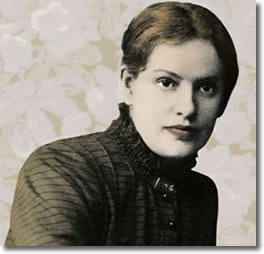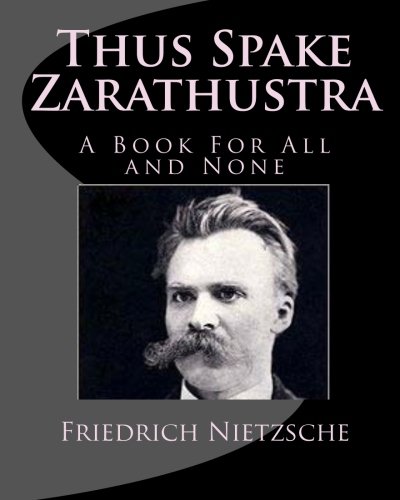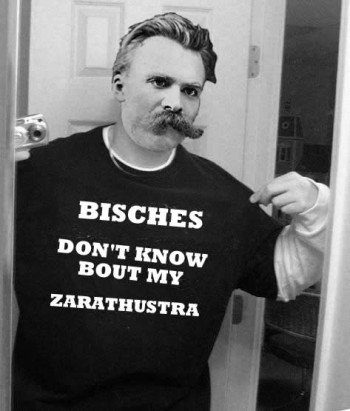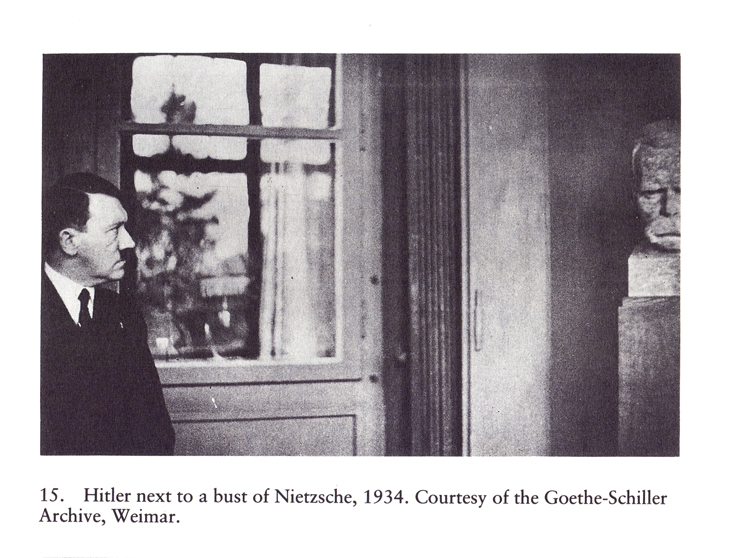GFR7
New member
Right; I was really trying to hide this by putting it in my signature,In a previous post where I linked numerous articles showing how Islam, like the homosexual movement, loves their little boys, I highlighted what the author of the article wrote about the German philosopher Friedrich Nietzsche:
"One of the reasons Nietzsche hated Christianity was that it "made something unclean out of sexuality", whereas Islam, many would argue, was sex-positive. One cannot imagine any of the Church fathers writing ecstatically of heavenly sex as al-Suyuti did, with the possible exception of St Augustine before his conversion."
72 Virgins and Boys
http://www.albatrus.org/english/religions/islam/72virgins_and_boys.htm
Since GayForReal7 seems to admire Nietzsche, (being that he uses a quote of his on his signature at the bottom of each post that he writes) I thought that we should learn more about ole Freddy boy.
From the homosexual website "glbtq: an encyclopedia of gay lesbian bisexual transgender and queer culture".
Nietzsche, Friedrich (1844-1900)
Friedrich Nietzsche is both one of the most influential and one of the most misunderstood of modern philosophers. Born into a sexually repressed family in the earlier nineteenth century, and plagued with ill health, much of Nietzche's work expresses a search for a primal joie de vivre that he felt had been squashed and distorted by the hypocritical religiosity and overbearing morality of his time.
Nietzsche himself fell victim to the same repressive forces. Although he had intimate and intense relationships with other men, he was never able to have an openly sexual relationship with either gender, and some historians believe he died in the mental torment of late-stage syphilis acquired from male prostitutes.
After his death, parts of his work were used by Nazis and other anti-Semites to reinforce their mythology of an Aryan super race. His writings unquestionably contain misogyny, racism, and anti-Jewish statements. However, Nietzsche's iconoclastic and individualistic ideas are too complex to fit comfortably within any ideology, and his influence extends far to the left as well as to the right.
Friedrich Nietzsche was born on October 15, 1844 in Roecken, Saxony. His father, Karl Ludwig Nietzsche, was a Lutheran minister who died from a painful brain disease when young Friedrich was only four.
Nietzsche was raised in a household of five women: his mother, sister, grandmother, and two aunts. However, it was not a warm home. His female relatives had a Prussian severity that caused them to be reserved with the young boy in their care.
When he was fourteen, Nietzsche received a scholarship to a boarding school called Schulpforta, near the town of Naumburg, where the family had moved after Karl Ludwig's death.
It was while studying at Schulpforta that Nietzsche experienced his first romantic relationship with a boy. He wrote poems about his love, and also discovered the poetry of such gay or bisexual literary figures as August von Platen and George Gordon, Lord Byron.
Nietzsche was a brilliant and creative student, and in 1864, he entered the university in Bonn to study theology and philology. At Bonn, he became a member of the Franconia fraternity, and may have had homoerotic relationships with other students. He also came under the influence of the philologist Friedrich Wilhelm Ritschl, who encouraged him to study classics.
A year later, Nietzsche followed Ritschl to the university in Leipzig, where he continued his studies. There he met and became intimate with another student, Erwin Rohde. He and Rohde shared a fascination with ancient Greek culture. At Leipzig, Nietzsche discovered the work of philosopher Arthur Schopenhauer, whose atheistic view of the world greatly influenced him.
During the late 1860s, while teaching and writing in Basel, Nietzsche became involved with composer Richard Wagner. What started as a passionate infatuation for the composer's music and personality deteriorated into jealousy, intellectual argument, and bitterness. Nietzsche had become very close to fellow philosopher Paul Ree. Ree was Jewish, and the notorious anti-Semite Wagner snubbed him, further alienating Nietzsche. He withdrew his friendship with hostility, and Wagner spread rumors that hinted of Nietzsche's homosexuality.
The philosopher continued to teach, write, and travel, publishing Untimely Meditations (1873-76) and Human, All Too Human (1878-79), while making several visits to an area of Sicily that was home to a colony of expatriate homosexuals.
Read more: http://www.glbtq.com/social-sciences/nietzsche_f.html

The things that we learn about our fellow TOL'ers simply by looking into their signature.
Moving on....
along with his name, right? :chuckle:
But then, I did my Honors Thesis on Nietzsche's Geneology of Morals......
Last edited:










